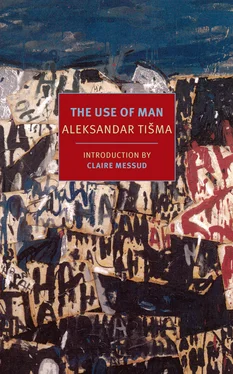Aleksandar Tišma - The Use of Man
Здесь есть возможность читать онлайн «Aleksandar Tišma - The Use of Man» весь текст электронной книги совершенно бесплатно (целиком полную версию без сокращений). В некоторых случаях можно слушать аудио, скачать через торрент в формате fb2 и присутствует краткое содержание. Год выпуска: 2014, Издательство: NYRB Classics, Жанр: Современная проза, на английском языке. Описание произведения, (предисловие) а так же отзывы посетителей доступны на портале библиотеки ЛибКат.
- Название:The Use of Man
- Автор:
- Издательство:NYRB Classics
- Жанр:
- Год:2014
- ISBN:нет данных
- Рейтинг книги:5 / 5. Голосов: 1
-
Избранное:Добавить в избранное
- Отзывы:
-
Ваша оценка:
- 100
- 1
- 2
- 3
- 4
- 5
The Use of Man: краткое содержание, описание и аннотация
Предлагаем к чтению аннотацию, описание, краткое содержание или предисловие (зависит от того, что написал сам автор книги «The Use of Man»). Если вы не нашли необходимую информацию о книге — напишите в комментариях, мы постараемся отыскать её.
A work of stark poetry and illimitable sadness,
is one of the great books of the 20th century.
The Use of Man — читать онлайн бесплатно полную книгу (весь текст) целиком
Ниже представлен текст книги, разбитый по страницам. Система сохранения места последней прочитанной страницы, позволяет с удобством читать онлайн бесплатно книгу «The Use of Man», без необходимости каждый раз заново искать на чём Вы остановились. Поставьте закладку, и сможете в любой момент перейти на страницу, на которой закончили чтение.
Интервал:
Закладка:
Sredoje was locked up again. He was not worried about the accusations, knowing they would be refuted. What troubled him were the damp ground on which he sat and slept, the dirt he had picked up on the way, which made him itch all over, and his hunger. But those were troubles of the body, not the soul, and they brought him closer to the men among whom he suddenly found himself. It was strange the way it had all happened, but if he looked back on it — and he spent all his time doing just that; they had ordered him to remember — he saw that what had happened was in fact perfectly logical, and even inevitable. His life in Belgrade had become unendurable, a sleepwalker’s trance between the perils of wartime reality and his own wild desires, desires that mirrored Captain Waldenheim’s secret vice. One of them had to come to grief. That it had been Waldenheim seemed to Sredoje proof of his greater strength, of the accuracy of his instinct, and at the same time proof of the superiority of these rebellious men to whom that single shot had joined him. It was as if that shot had roused him from a sick dream.
The Germans, on whom he had looked with admiration mixed with fear, could not establish their cold, premeditated rule as long as the people on whom they tried to impose it were stubborn, independent, hardy, resilient. He, too, was like that; the shot was proof of it. He belonged among them. But between him and them still lay the intelligence officer’s suspicion. Whenever Sredoje emerged from the darkness of the shed, blinking his eyes, and found the men lying on the ground eating or getting ready to go somewhere, their eyes met his with curiosity, but also with distrust. It was not until three weeks later, when news came from Belgrade that Lazukić the lawyer had been seized and shot, that the suspicion lifted from him. Although, once again, no one informed him of this; he would find out much later, when he secretly read his own file.
They let him out of the shed and assigned him to a Partisan group as an unarmed auxiliary. From then on, he slept with the others under the trees, or, when he was lucky, in the entryway of the wooden house. He shared their scanty, usually dry food. But despite the fact that the most serious accusation had been withdrawn, his unusual past was an object of derision: the killing of the German captain (the story told with stifled laughter), his service in the police, his education.
The detachment, which had been in the woods around Zlatibor for nearly two months now, was made up of local peasants who had joined in fear of reprisals following Partisan actions. The “schoolboy,” as Sredoje was called, and the commissar, a former teacher, away at that time, complemented their limited experience and wish for immediate vengeance. On the move from hill to hill, with a piece of bread and cheese in their pockets, the peasants suffered because they were not at home with their girls or loving wives, and because hiding took them into unknown regions, into dangers from which they might not return. Sredoje, on the other hand, considered those hardships natural. For him, there was no return to the past, to what was left behind; he thought, instead, about ways to improve things. Therefore, although a newcomer, he was a better and more able soldier than many.
He showed his mettle in the very first skirmish. It came about unexpectedly, with the arrival of a German unit that had been drawn into the mountains by the deceptive promise of an easy victory. In the general confusion, Sredoje was ordered to carry ammunition to the machine gunner, but when a bullet hit the machine gunner’s hand, after an instant’s hesitation Sredoje took the man’s place and pulled the trigger. He did this when he saw green uniforms jumping out from behind the trees. If they captured him, they would torture him and kill him. But his action was also spurred by the fascination he now had for killing, for violent death, which he had had a taste of in the hunting lodge and in the square in Požega, too, that same day — a vivid memory of every movement, every sound, charged with the horror of how thin was the line between life and death and how easy it was to cross it.
Now he fired and was being fired at. Would he be the first to be hit by a bullet, or would his bullet hit the man who was aiming at him, trying to make him the victim? And suddenly that man, so threateningly alive, so intent on him — Sredoje — as if they were linked, the two of them, would fall and cease to be, with his strength, his consciousness, including the images he carried within him, the image of Sredoje, too; and there would be nothing left of him, like a splinter from a tree that the bullet on its murderous course broke off in passing. Sredoje wished to repeat, to experience again and again that passage, that risk, that excitement, and this, combined with his new sense of belonging, would sustain him through the hardships and illnesses of the Partisans, and bring him, after a radio operator’s course and a transfer to a Vojvodina unit, back again, on October 27, 1944, as a liberator, to Novi Sad, where there was no trace of his former existence, with the exception of Anna Drentvenšek’s diary.
21
May 4, 1935
With God’s help.
May 6
For Orthodox Serbs today is a holiday. Only four lessons, so more time for rest and reflection. I don’t feel too well, a slight fever as usual. Still, I have decided, though not for the first time, to begin my diary today. Perhaps these words will bring me consolation when all this is done, when youth has passed — a youth I can still feel sometimes coursing through my veins, but sometimes it seems that the thread of life is getting thinner. If it breaks, no one will shed a tear over me. A coldness in the depths of my heart, like ice. God in Heaven, send the sun to shine into my weary heart. My life until now has been a deception. If only I could lay down my weary, tormented head to rest. But where? Beside Kleinchen? Dear, sweet Kleinchen, I have found you again, only to realize that I will never obtain what I desire. I think of you day in, day out. I can’t wait for the day you will come — soon, soon. Today is the 6th. A few hours of happiness then, when everything around me turns to brightness. But never over the line ! No, I must remain virtuous, for your sake and for my sake! You, you, is the cry inside me. In a short while I’ll see you — only to suffer again afterward. You! You!
May 16
Disappointment again. No Kleinchen, though I was sure he would come. A night full of sadness. My heart was in pain. My life — what emptiness! How awful it is to be awake in the middle of the night! I feel that I have lost something precious, though I never truly possessed it. You! You! How am I to get over you?
I have my work. My work will help me to survive. Why can’t I find what my weary soul has been seeking all these years? To be kind, kind to everyone, particularly to him! But he was noble, and could behave no other way. How he kissed, how he held me, without asking for what every man wants! If only I could see him, see his dear, intelligent eyes! Hard days of struggle lie before me. But God is with me.
May 18
Gloom, gloom! Yesterday I waited, today I hoped — for a word at least. Now I have given up hope. He could have written a letter, a note. Kleinchen, I don’t reproach you, because I love you! I would give my life to see you! No, I mustn’t despair. I knew this would happen. I must be strong, that’s all. But I feel so weak!
The school year is nearly over. Soon I’ll be free. Then I intend to recover — if I can. Go off somewhere and forget. Where, I don’t know. Victor Hugo said poverty makes a hole in the heart and places hate there. But I won’t hate you. May God help me to forget! But it’s so hard. I love him. My heart is filled with pain.
Читать дальшеИнтервал:
Закладка:
Похожие книги на «The Use of Man»
Представляем Вашему вниманию похожие книги на «The Use of Man» списком для выбора. Мы отобрали схожую по названию и смыслу литературу в надежде предоставить читателям больше вариантов отыскать новые, интересные, ещё непрочитанные произведения.
Обсуждение, отзывы о книге «The Use of Man» и просто собственные мнения читателей. Оставьте ваши комментарии, напишите, что Вы думаете о произведении, его смысле или главных героях. Укажите что конкретно понравилось, а что нет, и почему Вы так считаете.












